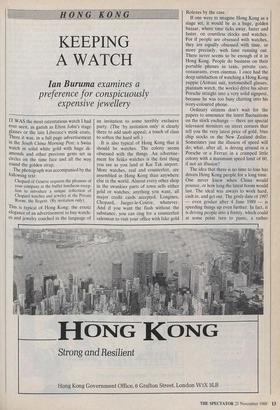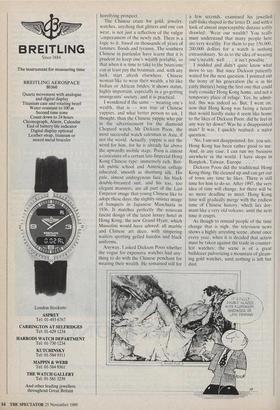HONG KONG
KEEPING A WATCH
Ian Buruma examines a
preference for conspicuously expensive jewellery
IT WAS the most ostentatious watch I had ever seen, as garish as Elton John's stage glasses or the late Liberace's mink coats. There it was; in a full page advertisement in the South China Morning Post: a Swiss watch in solid white gold with huge di- amonds and other precious gems set in circles on the time face and all the way round the golden strap.
The photograph was accompanied by the following text:
Chopard of Geneve requests the pleasure of your company at the buffet luncheon recep- tion to introduce a unique collection of Chopard watches and jewelry at the Private Room, the Regent. (By invitation only).
This is typical of Hong Kong: the ersatz elegance of an advertisement to buy watch- es and jewelry couched in the language of an invitation to some terribly exclusive party. (The by invitation only' is clearly there to add snob appeal; a touch of class to soften the hard sell.)
It is also typical of Hong Kong that it should be watches. The colony seems obsessed with the things. An advertise- ment for Seiko watches is the first thing you see as you land at Kai Tak airport. More watches, real and counterfeit, are assembled in Hong Kong than anywhere else in the world. Almost every other shop in the swankier parts of town sells either gold or watches: anything you want, all major credit cards accepted, Longines, Chopard, Jaeger-le-Coiltre, whatever. And if you want the flash without the substance, you can ring for a counterfeit salesman to visit your office with fake gold Rolexes by the case.
If one were to imagine Hong Kong as a stage set, it would be as a huge, golden bazaar, where time ticks away, faster and faster, on countless clocks and watches. For if people are obsessed with watches, they are equally obsessed with time, or more precisely, with time running out. There never seems to be enough of it in Hong Kong. People do business on their portable phones in taxis, private cars, restaurants, even cinemas. I once had the deep satisfaction of watching a Hong Kong yuppie (Armani suit, tortoiseshell glasses, platinum watch, the works) drive his silver Porsche straight into a very solid signpost, because he was too busy chatting into his ivory-coloured phone.
Ordinary citizens don't wait for the papers to announce the latest fluctuations on the stock exchange — there are special television monitors on street corners that tell you the very latest price of gold, blue chip stocks or the New Zealand dollar. Sometimes just the illusion of speed will do; what, after all, is driving around in a Porsche or a Ferrari in a cramped little colony with a maximum speed limit of 60, if not an illusion?
The idea that there is no time to lose has driven Hong Kong people for a long time. One never knew when China would pounce, or how long the latest boom would last. The ideal was always to work hard, cash in, and get out. The grisly date of 1997 — even grislier after 4 June 1989 — is speeding things up even further. In fact, it is driving people into a frenzy, which could at some point turn to panic, a rather
HONG KONG
Strong and Resilient
Hong Kong Government Office, 6 Grafton Street, London W1X 3LB
horrifying prospect.
The Chinese craze for gold, jewelry, watches, anything that glitters and one can wear, is not just a reflection of the vulgar temperament of the newly rich. There is a logic to it, based on thousands of years of famines, floods and tyranny. The southern Chinese in particular have learnt that it is prudent to keep one's wealth portable, so that when it is time to take to the boats one can at least pay the boatman, and, with any luck, start afresh elsewhere. Chinese woman like to wear their wealth, a hit like Indian or African brides: it shows status, highly important, especially in a go-getting immigrants' society, and it is practical.
I wondered if the same — wearing one's wealth, that is — was true of Chinese yuppies. and what better person to ask, I thought, than the Chinese yuppie who put in the advertisement for the diamond Chopard watch, Mr Dickson Poon, the most successful watch salesman in Asia, if not the world. Actually, yuppie is not the word for him, for he is already far above the upwardly mobile stage. Poon is almost a caricature of a certain late-Imperial Hong Kong Chinese type: immensely rich, Brit- ish public school and American college educated, smooth as shantung silk. His pale, almost androgynous face, his black double-breasted suit, and his too, too elegant manners, are all part of the Last Emperor image that young Chinese like to adopt these days: the slightly sinister image of banquets in Japanese Manchuria in 1936. It matches perfectly the nouveau fascist design of the latest luxury hotel in Hong Kong, the new Grand Hyatt, which Mussolini would have adored: all marble and Chinese art deco, with simpering waiters sporting gelled hairdos and black uniforms.
Anyway, I asked Dickson Poon whether the vogue for expensive watches had any- thing to do with the Chinese penchant for wearing their wealth. He remained still for
a few, seconds, examined his jewelled cuff-links shaped in the letter D, and with a look of almost imperceptible distaste softly drawled: 'Wear our wealth? You really must understand that many people here are very wealthy. For them to pay 150,000. 200,000 dollars for a watch is nothing extraordinary. So as to the idea of wearing one's wealth, well . . . it isn't possible.'
1 nodded and didn't quite know what more to say. But since Dickson patiently waited for the next question. I pointed out the irony of his generation (he is in his early thirties) being the first one that could truly consider Hong Kong home, and not a temporary place of refuge. Yes, he admit- ted, this was indeed so. But, I went on, now that Hong Kong was facing a future that would hardly make it seem like home to the likes of Dickson Poon, did he feel in any way let down? Was he a disappointed man? It was, I quickly realised, a naïve question.
'No, I am not disappointed, for, you see, Hong Kong has been rather good to me. And, in any case, I can run my business anywhere in the world. I have shops in Bangkok, Taiwan, Europe . .
Dickson Poon did the traditional Hong Kong thing. He cleaned up and can get out of town any time he likes. There is still time for him to do so. After 1997, the very idea of time will change, for there will be no more deadline to meet. Hong Kong time will gradually merge with the endless time of Chinese history, which lies dor- mant like a very old volcano, until the next time it erupts.
As though to remind people of the time change that is nigh, the television news shows a highly arresting scene, about once every year, when it is decided that action must be taken against the trade in counter- feit watches: the scene is of a great bulldozer pulverizing a mountain of gleam- ing gold watches, until, nothing is left but dust.











































































 Previous page
Previous page